Building collaborative approaches to global security
Three ambassadors. Two generals. One president. And more than a dozen women peacebuilders from around the globe. These leaders, and many more, came together on October 15 at Collaborative Approaches to Global Security—presented by Inclusive Security in association with the U.S. Department of State.
Together, our goal was to foster ideas about how to build lasting stability. Currently, 25 to 50 percent of all peace agreements fall apart within five years. But when processes are inclusive, agreements are 64 percent less likely to fail. When they specifically include women, the agreement becomes 35 percent more likely to endure for at least 15 years.
Find these stats and more in our new “Why Women?” report. Read more »
The evidence is clear. But how can we shift the way the world thinks about security? Here are seven key insights from the event.
1. We need to look at war and peace through a different lens.
Our traditional approach to ending conflicts doesn’t work. Inclusive Security’s Founder and Chair, Ambassador Swanee Hunt, learned that during the Bosnian war. Too often, she noted, we think “How do you stop a war?” rather than “How do you build peace?”
“Women have phenom. ideas & agency, but we’re taking that away from them by talking 2 the men with guns instead.”-@almmura #securetogether
— GameChangers360 (@Changers360) October 16, 2015
This isn’t semantics. In Libya, Alaa Murabit noted, “We go up to the men with guns—the ones who bombed the schools—and we say ‘Can we please sit down with you and talk about how this bad guy can forgive this other bad guy for ruining the community?’” This is a short-sighted way to resolve conflict, focusing only on ceasing hostilities, not on addressing root causes.
Inclusive security is a fundamental shift toward the long-term. Our Vice Chair Miki Jacevic put it this way: “Just as we are thinking about how many bombs we will send, how many bullets we will sell…we should also be thinking: ‘What are women’s organizations in Syria, in Afghanistan, in Iraq doing right now that should be part of our decisions.’”
Watch our video about applying a different lens to the war in Bosnia:
2. Ignoring women puts everyone’s lives at risk.
Irene Santiago, one of the few women in the world with direct experience in official peace negotiations, likes to say “If we are serious about peace, we have to take women seriously!”
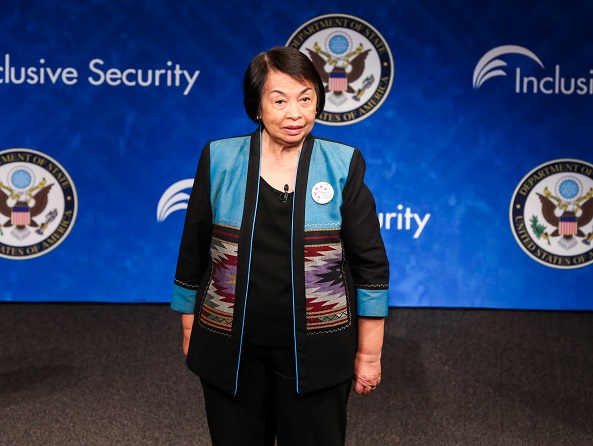
Irene Santiago, former negotiator for the government of The Philippines and organizer of the historic Beijing Women’s Forum in 1995.
There’s a flip side to this truth that echoed throughout the event. If we ignore women, if we don’t meaningfully include them in decision making, we risk destabilizing whole societies. Afghan activist Wazhma Frogh validated this idea with a stunning example: In southern Afghanistan, women noticed an influx of suspicious individuals in their community who claimed to be Uzbek businessmen and took great interest in the young men of the village. The women suspected the group was, in fact, targeting boys for recruitment into terrorist forces. They presented their concerns to a government official, who laughed them out of his office. A month later, the new recruits abducted 32 passengers from a public bus and killed them all. Now Wazhma reflects: “Imagine if the minister had listened to us.”
It is the communities who can see the early signs of threat, and we need the security forces to listen to them #securetogether #1325at15
— Salma Nims (@Salmanims) October 15, 2015
3. Violent extremists utilize all available tools. So must we.
When we polled the audience about what they consider the greatest security threat of the next 20 years, “violent extremism” was second on the list, topped only by “state fragility.” For many governments, including the US, countering violent extremism is at the top of the policy agenda.
What do you think is the greatest threat to global #security? @InclusvSecurity @StateDept #securetogether pic.twitter.com/eCcHaIIsI9
— PSFG (@PSFundersGroup) October 15, 2015
Examples from Afghanistan, Pakistan, Libya, and more show that inclusive approaches are key to addressing this global threat. Mossarat Qadeem, for instance, related how she works with mothers, religious leaders, and others to deradicalize young Pakistani men who are on the path to becoming suicide bombers. And, as Wazhma Frogh of Afghanistan put it: “The world talks about including women; extremists are already doing it.”
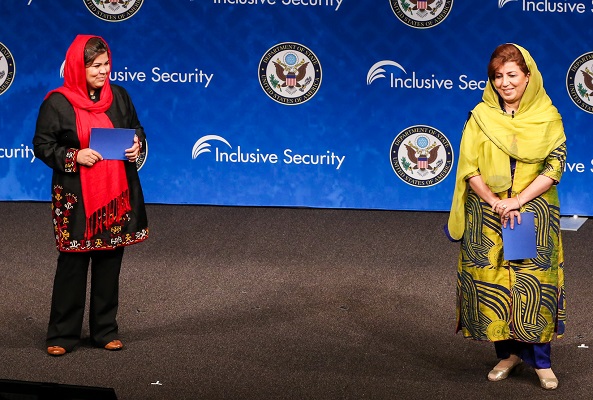
Afghan activist Wazhma Frogh and Pakistani educator Mossarat Qadeem discussed the common struggles of their two countries.
In a special video address, Gen. John Allen, Special Presidential Envoy for the Global Coalition to Counter ISIL, noted the tactics extremists in Syria and Iraq have used both to recruit and to repress women. “But if we see women only as victims,” he asserted, “we’re overlooking a core resource— the essential partner in this fight.”
Watch Gen. Allen’s video address:
4. There is no such thing as a “soft” issue.
A characteristic excuse for not including women in peace negotiations is that “women’s issues” or “soft” issues can wait until after the violence is stopped.
But as Ruth Caesar of Liberia noted when relating women’s efforts to curb Ebola earlier this year, there is no such thing as a “soft” issue. “The issues that development planners classify as ‘soft’ issues—education, health, social change, economics, livelihood issues…they are the issues that are fundamental to peace.”
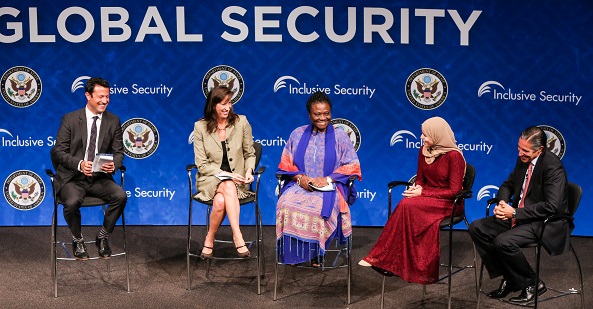
Ruth Caesar (center) of Liberia discusses future threats to security, from pandemic disease to state fragility, with (from left) Kevin Baron, Defense One; Paige Alexander, USAID; Alaa Murabit, The Voice of Libyan Women; and Oscar Fernandez-Taranco, UN Peacebuilding.
“Ebola was war, but we didn’t know the enemy. For women it was a peace issue.” #securetogether
— Cathy Russell (@AmbCathyRussell) October 15, 2015
Where women get a seat at the table, they raise topics like refugee return, compensation for victims, and transitional justice—issues that are critical to ensuring grievances don’t resurface and communities can coexist. In Northern Ireland, Monica McWilliams and her women’s coalition elevated just such concerns in the official negotiations that led to the Good Friday Agreement. Decades later, their insistence that integrated education for Catholics and Protestants was more than a so-called “soft” issue is one of the reasons that peace has stuck.
5. Boundaries can and must be crossed.
This was an event about collaboration. So it’s only fitting that one of the key takeaways was about crossing boundaries—whether between policymakers and women leaders on the ground or between groups at war.
In Sudan and South Sudan, women have been working together across conflict lines for decades, from the time when the two countries were one. Though they are now divided by a border, women like Maria Abbas and Paleki Matthew Obur Ayang know their futures lie together. “Everyone assumed at that time that we women would stop working together,” said Maria, who advises the Taskforce on the Engagement of Women in Sudan and South Sudan, “But we are too interconnected.”
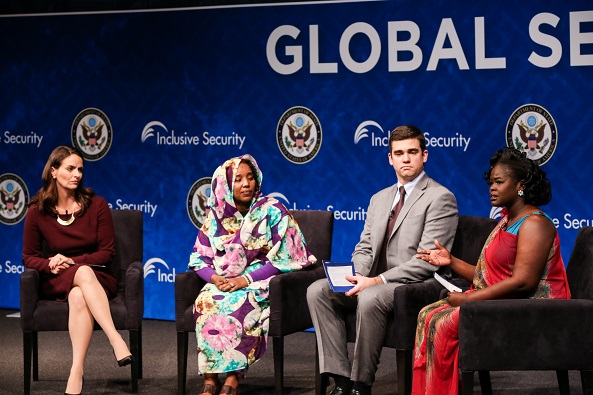
From left to right, Jacqueline O’Neill, Director of Inclusive Security; Maria Abbas of Sudan; Joseph Tucker, formerly in the Office of the US Special Envoy for Sudan and South Sudan; and Paleki Matthew Obur Ayang of South Sudan, discussing women’s cooperation across divides.
Similarly, the divide between policymakers in Washington and women resolving conflict in their communities must be bridged if we want our approaches to security to be effective. From mid-level State Department officials to four-star generals, the speakers were clear on one thing: collaboration is necessary.
Inclusion of women is easy and effective –Joseph Tucker, Deloitte #securetogether
— Danielle Ehioghiren (@DanielleEhio) October 15, 2015
6. Promises must be backed by action.
Since the passage of UN Security Council Resolution 1325 in 2000, the international community has endorsed dozens of declarations and policies that recognize women’s contributions to peace and security. But progress has been slow.
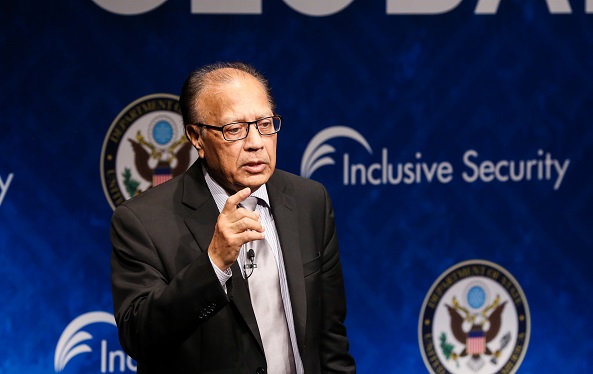
Ambassador Anwarul Chowdhury, former President of the UN Security Council, reflects on progress since the adoption of UN Security Council Resolution 1325.
As President Michelle Bachelet of Chile relayed in a video address, “It is not enough to adhere to the principles of the resolution. No. We must be able to incorporate these principles into inclusive public policies.” Likewise, Ambassador Anwarul Chowdhury, known affectionately as the “father of 1325” urged attendees to push inclusive security to the top of the global agenda. Sadly, according to Oscar Fernandez-Taranco, UN Assistant Secretary-General for Peacebuilding Support, only two percent of UN funding for peace and security goes toward gender equality programming.
Wow. Only 2% of global peace & security funds go to women’s empowerment and gender equality programs. @UNPeacekeeping #securetogether
— Rachel Isaacs (@rxi) October 15, 2015
One way to realize the promises of 1325 is—as the US and 55 other countries have done—to adopt national action plans that implement, and direct funding for, relevant policy priorities. Catherine Russell, US Ambassador-at-Large for Global Women’s Issues, noted that the US just announced a series of pledges, totaling $31 million, that demonstrate “our ongoing commitment to women as equal partners in peace and security.”
7. Each of us plays a role in making inclusion a reality.
Though this is a collective, global movement, every one of us can help take inclusive security forward. Individuals from all walks of life—from career diplomats to grassroots mobilizers, from generals to journalists—joined together on stage to advance this common goal. And their examples and insights prove that each of us has a role to play.
Why include women in peace processes? “It’d be stupid not to” says Lt. Gen. Dan “Fig” Leaf. @InclusvSecurity #securetogether
— NDI Gender & Women (@NDIWomen) October 15, 2015
In a powerful closing, Pastor Esther Ibanga of Nigeria asserted that “All it takes is the willpower and the desire to make a change.”
Watch the closing segment:
We couldn’t distill all the inspiring, funny, and edifying moments from Collaborative Approaches to Global Security into one blog post—click here to watch the full video or check out some of our favorite photos.
This post originally appeared on inclusivesecurity.org



